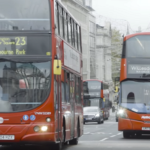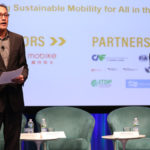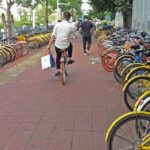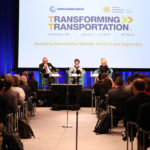Posts in the 'Integrated Transport' category
“Toward Car-Free Cities,” a blog series by WRI Ross Center for Sustainable Cities’ Urban Mobility Team, explores the challenges and opportunities for Transport Demand Management (TDM) strategies. TDM focuses on reducing the demand for private vehicles through combining public policy ...

This series, supported by the Volvo Research and Educational Foundations, discusses walking and cycling in cities with a special focus on low- and middle-income countries. Walking and cycling are the dominant modes of transport in African cities, and too often it’s ...

Autonomous vehicles (AVs) are already being tested in California, Pittsburgh, Singapore, Paris and Oslo. As they spread, they are becoming a natural flashpoint for debate. Proponents of AVs point to their promise of a safer, faster, cleaner and more convenient ...

What happens when 22,000 urbanists descend on your city for the biannual World Urban Forum? We present, we dialogue, we attend high-level sessions, side events, training events, and networking events. Maybe most importantly, we benefit from the open exchange of ...

To keep pace with a rapidly growing population, Bengaluru is making huge investments in transportation infrastructure. One of the city’s newest metro stations, Krishna Rajendra Market Station, is a vibrant case study of how urban development can affect different communities. ...

WRI Ross Center sat down with Mobike CEO Davis Wang at Transforming Transportation 2018 to talk about Mobike’s explosive global growth, next steps for more integrated urban mobility, and the company’s place in the crowded and growing global transport sector. ...

Mobility is undergoing a huge shift – from the emergence of shared cars and bicycles to the impending self-driving cars – and we’re just starting to understand the full effect on cities. The revolution has implications for equity, accessibility and sustainability, and has ...

As today’s urban areas house more than half the world’s population and produce more than 80 percent of global economic activity, cities are uniquely positioned to deliver sustainable solutions. However, poor local air quality and issues related to global climate change ...

Bike sharing systems in busy urban cores are not new. The first major breakthrough started 20 years ago with the so-called “third generation” of bike sharing systems introducing the use of smart cards to unlock and rent bikes. Today, bike ...

India’s urban transport sector has seen tremendous change in the last 15 years. This series examines the evolution of the for-hire vehicles sector (FHVs), the regulatory response to it and its place in the mobility network of the future. While ...

In April, Piyush Goyal, the power minister at the time, claimed that India would introduce electric vehicles with such vigor that by 2030, there would be no petrol or diesel vehicle left to register. The following month, the Niti Aayog ...

China has more than 16 million bikes on the streets today that don’t belong to anyone and pass from rider to rider with the tap of a smartphone. With the new addition of new dockless models, many are simply left ...

Beyond the technological revolution underway in transport today, gender was an underlying theme of Transforming Transportation this year. Transport is not gender neutral, not matter where you are, said a chorus of experts during the opening panel on day two. “Gender is often a more robust determinant of modal choice than ...

Dozens of “dockless” bike-sharing startups have emerged in the past few years, offering apps where riders can locate bicycles, unlock them and leave them wherever their ride ends. The result in some Chinese cities has been more than a million ...

“We are seeing in cities around the world and transport systems around the world, the beginning of a revolution,” said World Resources President and CEO Andrew Steer in Washington today. Welcoming more than 800 transport experts, policymakers, researchers and private ...

Page 9 of 135« First...8910...2030...Last »






















